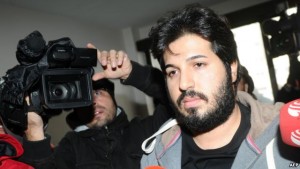Special to WorldTribune.com
By Charles Recknagel, Radio Free Europe / Radio Liberty
Night-time police raids in Istanbul.
Reports of shoe boxes stuffed with $4.5 million in cash hidden in the home of a Turkish state bank head, plus a money-counting machine in the bedroom of a government minister’s son.
And allegations that state funds are being used illegally to buy and funnel gold to Iran to help it evade international sanctions over its nuclear program.

Welcome back to 2013, when Turkey was rocked by a corruption scandal that implicated some of the closest associates of then-Prime Minister Recep Tayyip Erdogan.
Over the next months, the case would mesmerize the public as it mushroomed into a head-on clash between the investigators and Erdogan himself, who would accuse them of being part of a shadowy “state within a state” seeking to tarnish his government.
Within a year, dozens of prosecutors and police officials would be removed on executive orders from the case, the investigation would be dropped, and Erdogan would emerge with the image of a far more authoritarian leader than before.
Now the corruption scandal that so fascinated Turks three years ago is back in the news, thanks to the arraignment this week in New York of the key suspect in the case — a Turkish gold trader and socialite who allegedly acted as the intermediary between Turkey and Iran.
Arrested last month in Miami, Reza Zarrab pleaded not guilty on April 28 to charges of conspiring with two Iranians to conduct hundreds of millions of dollars in financial transactions to help Tehran obtain gold and hard currency despite U.S. sanctions cutting off Iran’s access to global financial systems.
According to Turkish investigators in 2013 Zarrab, a dual Turkish and Iranian citizen, was at the heart of a massive corruption scheme that involved payoffs to top Turkish officials. Under the scheme, Turkey legally purchased Iranian oil and gas for Turkish lira — something permitted under the sanctions regime — but the lira was then surreptitiously converted to banned bullion, euros, and U.S. dollars in Dubai before being delivered to Tehran by suitcase-toting couriers.
The question now is whether Zarrab’s case could resonate beyond the United States to reawaken the investigation in Turkey that created such a political crisis for Erdogan. The answer, to be known only over the coming weeks, will do much to provide the measure of how Erdogan, now president, views the role of the judiciary and the role of political opposition in Turkey today.
Turkey’s Fork In the Road
Many political analysts see the Iran-gold scandal as a watershed movement that changed Erdogan into a leader who is increasingly seen as intolerant of opposition and routinely tries to use the branches of government to crush it.
“He made sure by making big changes in the judiciary and among the police that all the dossiers [in the investigation] are closed and ever since that moment he has stepped up his fight against what he perceives as forces that want to topple him,” says Barcin Yinanc, who reports on politics for Hurriyet Daily News in Istanbul.
She says the Iran-gold scandal, in which four government ministers resigned as unidentified sources in the judiciary leaked investigators’ findings to the press, convinced Erdogan that parts of Turkey’s judicial and police forces were riddled with a network of enemies that had to be crushed by force.
Exactly who comprises the network was never directly stated, but Erdogan has used references that make it clear to Turkish listeners he accuses the followers of a once-allied but now archrival Turkish political leader, the influential Muslim cleric Fethullah Gulen.
Gulen, who has lived in the United States since 1999 but whose supporters helped to bring Erdogan’s Islamist-based AK Party to power in 2002, later split with Erdogan over ideological differences. Some of his teachings directly clash with Erdogan’s own, including encouraging interfaith dialogue with Jews and Christians despite the Justice and Development Party (AKP) leader’s history of up-and-down relations with Israel.
Since the crackdown on the Gulen movement in Turkey, which included shutting down private exam-preparation centers that the movement uses to recruit new members and raise finances, Erdogan has taken an ever-harder line toward political opponents of all stripes.
“His intolerance toward dissent is not limited to the sympathizers of the Gulen movement, any kind of dissent is unwelcome by him,” Yinanc observes. “The very fact that there are nearly 2,000 legal cases that involve insults to the president shows that he is very intolerant of the tiniest criticism.”
With the Iran-gold scandal now back in the news, Erdogan may have to brace for new rounds of fire over a scandal that seems to refuse to disappear despite the quashing of the investigation.
Kemal Kilicdaroglu, leader of Turkey’s main opposition CHP, said when Zarrab was arrested last month that he hoped the U.S. proceedings would shed new light on the complex affair.
“I am sure there are many who won’t sleep comfortably in their beds tonight,” he told a party meeting in parliament on March 22. “They will hang out all the dirty laundry, and this way we will learn the whole truth.”
